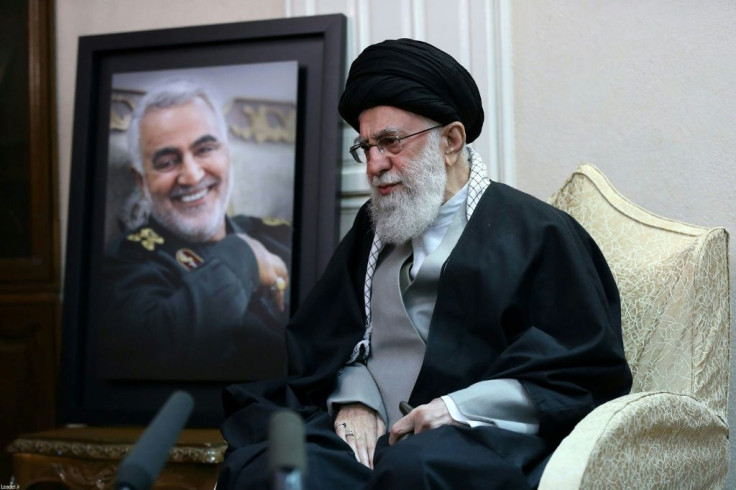Why Did US Target Qassem Soleimani? Trump Reveals Embassy Plot

KEY POINTS
- Soleimani, head of the IRGC's Quds Force, allegedly was planning to "blow up" the U.S. Embassy in Baghdad
- The House is debating whether to limit the president's ability to conduct military operations against Iran
- Sens. Rand Paul and Mike Lee were upset by White House briefing on Soleimani strike, which was light on details
President Trump said Thursday the U.S. killed an Iranian general because intelligence indicated he was planning to blow up the U.S. Embassy in Baghdad.
The administration finally briefed Senate lawmakers on the strike Wednesday, but some attendees described the session as lacking.
Trump’s comments came as the House began debating a war powers resolution that would restrict the president’s ability to take military action against Iran.
The U.S. conducted a targeted drone strike that killed Gen. Qassem Soleimani last week outside Baghdad airport, triggering threats of revenge from Iran that culminated in missile strikes against two bases housing U.S. military personnel in Iraq. No casualties and little damage were reported.
"We did it because they were looking to blow up our embassy,” Trump told reporters at the White House.
“We also did it for other reasons that were very obvious. Somebody died, one of our military people died. People were badly wounded just a week before, and we did it,” Trump said, referring to a series of events that led to the drone strike. A week earlier, an Iranian attack led to the death of a U.S. contractor, the U.S. retaliated and that action led to the storming of the U.S. Embassy in Baghdad by protesters chanting, “Death to America.”
“And we had a shot at him, and I took it and that shot was pinpoint accurate, and that was the end of a monster,” Trump added.
Soleimani, who was said to be responsible for the deaths and maiming of hundreds of U.S. troops, was head of the Quds Force, the arm of the Islamic Revolutionary Guards Corps tasked with spreading Iranian influence throughout the region. Iran backs militias in Iraq and Syria, as well as Houthi rebels in Yemen and Hezbollah in Lebanon.
U.S. officials earlier had said only that Soleimani was planning an imminent strike against U.S. diplomats and civilians, and have yet to release details. Lawmakers, mostly Democrats, have been protesting the lack of information.
Sens. Rand Paul, R-Ky., and Mike Lee, R-Utah, criticized Wednesday’s briefing and bristled at White House suggestions that lawmakers not debate the administration’s decision.
Lee called the briefing an “unmitigated disaster,” calling it “the worst briefing I’ve seen, at least on a military issue.”
<iframe width="416" height="234" src="//fave.api.cnn.io/v1/fav/?video=politics/2020/01/08/mike-lee-reaction-iran-briefing-unamerican-vpx.cnn&customer=cnn&edition=domestic&env=prod" frameborder="0"></iframe>
"It was instead about the possibility of future military action against Iran. And it was on that topic they refused to make any commitment about when, whether and under what circumstances it would be necessary for the president — for the executive branch of government — to come to Congress seeking authorization for the use of military force," Lee said in an NPR interview. "I find that unacceptable."
Paul said it’s ludicrous to believe the 2002 war powers resolution that authorized action against Saddam Hussein justifies the action taken against Soleimani.
"I see no way in the world you could logically argue that an authorization to have war with Saddam Hussein has anything to with having war with people currently in Iraq," Paul told reporters.
Both Paul and Lee said they would support a resolution limiting Trump’s ability to authorize military action against Iran.
© Copyright IBTimes 2024. All rights reserved.






















